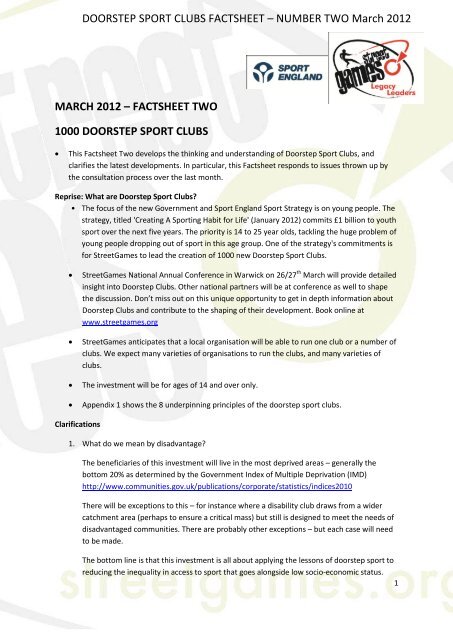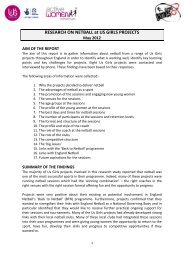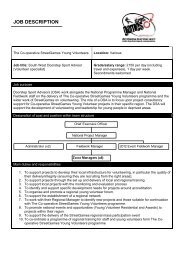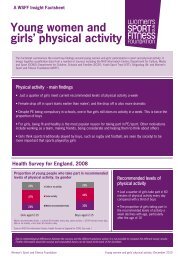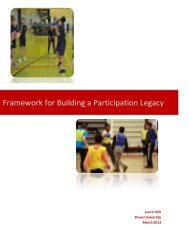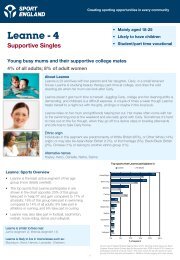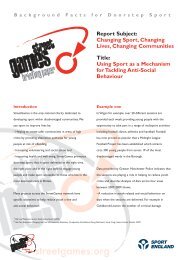The second Doorstep Sport Clubs factsheet - StreetGames
The second Doorstep Sport Clubs factsheet - StreetGames
The second Doorstep Sport Clubs factsheet - StreetGames
You also want an ePaper? Increase the reach of your titles
YUMPU automatically turns print PDFs into web optimized ePapers that Google loves.
DOORSTEP SPORT CLUBS FACTSHEET – NUMBER TWO March 2012<br />
MARCH 2012 – FACTSHEET TWO<br />
1000 DOORSTEP SPORT CLUBS<br />
<br />
This Factsheet Two develops the thinking and understanding of <strong>Doorstep</strong> <strong>Sport</strong> <strong>Clubs</strong>, and<br />
clarifies the latest developments. In particular, this Factsheet responds to issues thrown up by<br />
the consultation process over the last month.<br />
Reprise: What are <strong>Doorstep</strong> <strong>Sport</strong> <strong>Clubs</strong>?<br />
• <strong>The</strong> focus of the new Government and <strong>Sport</strong> England <strong>Sport</strong> Strategy is on young people. <strong>The</strong><br />
strategy, titled 'Creating A <strong>Sport</strong>ing Habit for Life' (January 2012) commits £1 billion to youth<br />
sport over the next five years. <strong>The</strong> priority is 14 to 25 year olds, tackling the huge problem of<br />
young people dropping out of sport in this age group. One of the strategy's commitments is<br />
for <strong>StreetGames</strong> to lead the creation of 1000 new <strong>Doorstep</strong> <strong>Sport</strong> <strong>Clubs</strong>.<br />
<br />
<br />
<br />
<br />
<strong>StreetGames</strong> National Annual Conference in Warwick on 26/27 th March will provide detailed<br />
insight into <strong>Doorstep</strong> <strong>Clubs</strong>. Other national partners will be at conference as well to shape<br />
the discussion. Don’t miss out on this unique opportunity to get in depth information about<br />
<strong>Doorstep</strong> <strong>Clubs</strong> and contribute to the shaping of their development. Book online at<br />
www.streetgames.org<br />
<strong>StreetGames</strong> anticipates that a local organisation will be able to run one club or a number of<br />
clubs. We expect many varieties of organisations to run the clubs, and many varieties of<br />
clubs.<br />
<strong>The</strong> investment will be for ages of 14 and over only.<br />
Appendix 1 shows the 8 underpinning principles of the doorstep sport clubs.<br />
Clarifications<br />
1. What do we mean by disadvantage?<br />
<strong>The</strong> beneficiaries of this investment will live in the most deprived areas – generally the<br />
bottom 20% as determined by the Government Index of Multiple Deprivation (IMD)<br />
http://www.communities.gov.uk/publications/corporate/statistics/indices2010<br />
<strong>The</strong>re will be exceptions to this – for instance where a disability club draws from a wider<br />
catchment area (perhaps to ensure a critical mass) but still is designed to meet the needs of<br />
disadvantaged communities. <strong>The</strong>re are probably other exceptions – but each case will need<br />
to be made.<br />
<strong>The</strong> bottom line is that this investment is all about applying the lessons of doorstep sport to<br />
reducing the inequality in access to sport that goes alongside low socio-economic status.<br />
1
DOORSTEP SPORT CLUBS FACTSHEET – NUMBER TWO March 2012<br />
2. Are doorstep sport clubs more than coaching sessions?<br />
A doorstep sport club does more than deliver sessions. <strong>The</strong> ethos of the club is critical. <strong>The</strong><br />
component parts of the ethos include:<br />
a. A retention strategy that includes social activities and membership - a sense of<br />
belonging and ownership for the young person – something local to belong to and feel<br />
positive about. Every organisation involved will be able to use the title and logo ‘A<br />
<strong>Doorstep</strong> <strong>Sport</strong> Club’.<br />
b. Collaborative coaching that makes for freedom of movement between sports in the<br />
multi-sport environment of the clubs. As well as offering fun doorstep multi –sport<br />
sessions, clubs will typically offer coaching and competition in one or specific sports.<br />
c. <strong>Clubs</strong> will be Youth led – the local young people will not just be consulted – they will<br />
have a direct say in what the club does and in organising the local offer. Every young<br />
participant will be encouraged to take a leadership role, no matter how big or small.<br />
d. Youth Volunteering – each club will provide volunteering opportunities for local<br />
youngsters who rise through the ranks of the club as participants. Our tried and tested<br />
sports youth volunteering programme run in partnership with <strong>The</strong> Cooperative will be<br />
available to doorstep sport clubs. This programme is designed to help a coach to<br />
support a young person to make the transition from participant to volunteer.<br />
3. <strong>The</strong> phrase sports citizenship or sports capital is being used. What does it mean?<br />
Drop-out and returning to sport is an under theorised aspect to sports development.<br />
Thinking about how to prepare people for lifelong participation – a habit for life – is<br />
underway. <strong>The</strong> concepts used in this discourse are sports citizenship and sports capital. <strong>The</strong>y<br />
are more or less synonymous concepts: they mean being the type of person with the selfbelief,<br />
confidence, skills, knowledge, aptitude and desire to be involved in sport and fitness<br />
now and always.<br />
<br />
<strong>Doorstep</strong> sport clubs will work with <strong>StreetGames</strong> to find ways to cultivate the appetite to<br />
adopt the sporting habit. Club members will be taught, mainly by their coaches, about life<br />
long participation – they will be invited to adopt the skills and confidence to join adult clubs,<br />
book or plan their own sport, and get involved with leadership responsibilities. We are<br />
working to understand how best to support a young person to develop a sporting habit for<br />
life and in due course will share the material with the sector.<br />
4. Which organisations know about the doorstep sport club proposal?<br />
<strong>The</strong> <strong>StreetGames</strong> network has been invited to comment on the proposal. So too have the<br />
CSPs and the national equity partners. We are in discussion with NGBs and at stage two<br />
meetings with 26. Some local authorities have also been consulted. Other organisations<br />
including Premier League, <strong>Clubs</strong> for Young People, Locality and Football League Trust are<br />
sharing the discussions too. More discussions with national and strategic sub-regional<br />
agencies are planned.<br />
2
DOORSTEP SPORT CLUBS FACTSHEET – NUMBER TWO March 2012<br />
<strong>The</strong> <strong>Sport</strong> England Regional teams – especially the local Government leads are also involved<br />
in the conversations.<br />
5. What is a <strong>Doorstep</strong> <strong>Sport</strong> Adviser?<br />
Because a <strong>Doorstep</strong> <strong>Sport</strong> Club is so much more than a sports session in an informal setting<br />
with disadvantaged youth (hard enough though that might be to coach well) we expect clubs<br />
will need support. This will be provided via <strong>Doorstep</strong> <strong>Sport</strong> Advisors - DSAs. Another way of<br />
thinking of them is as casually employed, sessional Fieldworkers. We are planning teams of<br />
DSAs in each region, each working a day or two a month. <strong>The</strong> team will have complimentary<br />
expertise in all they key areas of <strong>Doorstep</strong> <strong>Clubs</strong>.<br />
DSAs are experienced practitioners in doorstep sport who agree to share their knowledge<br />
with another organisation. Typically a DSA might give an afternoon a fortnight to this work,<br />
and their organisation is compensated financially rather than the individual. This keeps the<br />
money in doorstep sport.<br />
This approach is preferred to growing the <strong>StreetGames</strong> central staffing compliment because<br />
we want to prioritise spending to the front line. We are also keen to strengthen the<br />
doorstep sport network by promoting contact between projects through the DSA system.<br />
And we do not want to weaken projects by inviting the best project managers to leave their<br />
frontline roles and join our central staff. <strong>The</strong> DSA role also will give recognition to good<br />
practitioners, and provide a career development opportunity in doorstep sport.<br />
6. Training support<br />
<strong>The</strong>re will be a well developed training offer available to <strong>Doorstep</strong> <strong>Sport</strong> <strong>Clubs</strong>. <strong>The</strong> training<br />
offer is under construction. <strong>The</strong> club coaches will get lots of training and support. <strong>The</strong>y will<br />
be supported to understand the teenage market, provide sport in a doorstep style, be<br />
comfortable delivering in more than one sport, and committed to working alongside other<br />
coaches rather than on their own. We want to work with CSPs and SCUK amongst others to<br />
make good this training offer.<br />
7. What’s all this talk about Activators?<br />
This is a tricky one:<br />
First –what it doesn’t mean.<br />
a. <strong>The</strong> YMCA has an activator training course. We do not mean ‘activator’ in this branded<br />
sense.<br />
b. Some NGBs have recently developed a level ‘zero’ award, typically a 3 hour introductory<br />
workshop to provide coaches of all abilities practical tips on how to introduce the sport in a<br />
fun and adapted way to a youth market. <strong>The</strong>se workshops are sometimes titled ‘Activator<br />
award’ or ‘Leadership award’. From here on in, <strong>StreetGames</strong> will call them ‘Gateway’<br />
courses. <strong>StreetGames</strong> has worked with a number of NGBs to create new Gateway courses,<br />
including Athletics, Tennis, Basketball, Rugby, Rowing, Table Tennis, and Golf.<br />
3
DOORSTEP SPORT CLUBS FACTSHEET – NUMBER TWO March 2012<br />
c. In addition, some NGBs are using the title in new job posts. An NGB Activator is usually a<br />
professional Development Worker whose remit is to reach an informal sports market (not<br />
so much the traditional clubs and competitions). <strong>The</strong>y can work at city/town level or even<br />
more locally, and do lots of engagement work with young people to set up new kinds of<br />
sports participation. <strong>StreetGames</strong> is hoping that many NGBs develop these Activator<br />
Development Worker roles in deprived areas over the coming years.<br />
<strong>StreetGames</strong> is advocating this type of part time Activator role within a <strong>Doorstep</strong> <strong>Sport</strong> Club<br />
(probably about 5 to 10 hours a week). <strong>The</strong> person would be sport specific and very<br />
passionate about that sport. <strong>The</strong>y would probably hold a Level 2 coaching badge or higher.<br />
However, within the club they are half-coach/half sports development worker. He or she is<br />
networked in with the NGB and has skills in coaching, outreach work with young people, as<br />
well as networking between local organisations. <strong>The</strong> Activator is crucial to the provision of<br />
a single sport within a <strong>Doorstep</strong> Club, working with the young people to plan sessions,<br />
leagues, competitions, and tournaments, as well as recruiting and mentoring a team of<br />
coaches in that sport.<br />
8. When will the <strong>Doorstep</strong> <strong>Sport</strong> <strong>Clubs</strong> kick off?<br />
<br />
<br />
<br />
<strong>StreetGames</strong> hope to start work with trailblazers in June with a view to the first tranche<br />
proper starting in the late summer.<br />
<strong>The</strong> plan is to establish between 200 and 300 <strong>Doorstep</strong> <strong>Sport</strong> <strong>Clubs</strong> in the first year.<br />
Keep up to date with <strong>Doorstep</strong> <strong>Clubs</strong> on our website www.streetgames.org<br />
Appendix 1<br />
<strong>The</strong> 8 core principles of a <strong>Doorstep</strong> Club<br />
We expect organisations that sign up to creating doorstep sport clubs to be moving in the<br />
direction of achieving these 8 core principles. We know that not all will achieve them.<br />
1. Target disadvantaged young people from the age of 14. A key target for all <strong>Doorstep</strong> <strong>Clubs</strong> is<br />
to tackle drop out from sport at the age of 16 years and build in plans to encourage lifelong<br />
participation. We call the process of acquiring the habit of life-long participation ‘sporting<br />
capital’. (<strong>Doorstep</strong> <strong>Clubs</strong> will be able to cater for under 14’s, but will not attract investment<br />
for this age group from <strong>Sport</strong> England Lottery Fund).<br />
2. Youth Leadership - <strong>Doorstep</strong> Club activity will be shaped by the participants. This will mean<br />
that clubs will cater for a complete range of mixed ability from the casual fun participant to<br />
the talented player. Participants will also gain leadership in :<br />
a. <strong>Sport</strong>ing capital (being able to take responsibility for organising your own sports<br />
participation),<br />
b. Volunteering<br />
3. Collaboration with National Governing Bodies of <strong>Sport</strong> – <strong>Doorstep</strong> <strong>Clubs</strong> will work in<br />
partnership with a large number of NGBs to develop:<br />
a. membership/affiliation;<br />
4
DOORSTEP SPORT CLUBS FACTSHEET – NUMBER TWO March 2012<br />
b. new competitions and leagues;<br />
c. coach recruitment and education;<br />
d. new Activators – a dynamic coach that can engage really well with young people as<br />
well as network with a host of local agencies.<br />
4. Equity – all <strong>Doorstep</strong> <strong>Clubs</strong> will sign up to equity plans for girls, disability, and where<br />
relevant, bme. Some clubs will be girls only or disability only. We will draw on the expertise<br />
of Us Girls to shape our offer to young women. As a rule of thumb members of <strong>Doorstep</strong><br />
<strong>Clubs</strong> will reflect the demographics of the local area.<br />
5. A well trained and skilled workforce for <strong>Doorstep</strong> <strong>Clubs</strong> – a commitment to continuous up<br />
skilling of all the key roles that contribute to the effective planning and running of the clubs.<br />
All coaches, leaders and organisers will be able to join a <strong>Doorstep</strong> Club Organisers Group,<br />
and be encouraged to work in teams within and across sports to enhance the participants<br />
experience and journey.<br />
6. Evidence of impact and success – a consistent quality data capture system operated by all<br />
<strong>Doorstep</strong> <strong>Clubs</strong> and evaluated by <strong>StreetGames</strong>. In addition, important new research will be<br />
commissioned to capture the key shifts in policy, trends, and statistics.<br />
7. Brand and marketing – <strong>Doorstep</strong> <strong>Clubs</strong> will benefit from a strong brand and innovative<br />
marketing materials to enhance their local delivery.<br />
8. Sustainability – financial sustainability of <strong>Doorstep</strong> <strong>Clubs</strong> will be built into the planning from<br />
the very start and reviewed on a regular basis. We expect sustainability to be a product of<br />
enhanced fundraising skills and effective engagement with mainstream sport via eg NGBs<br />
and CSPs.<br />
5


